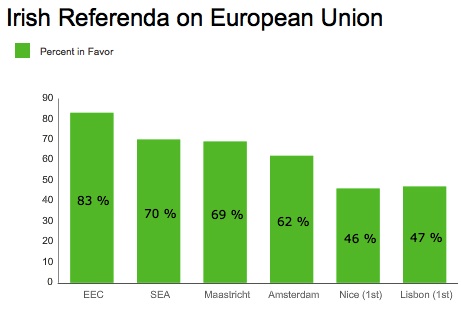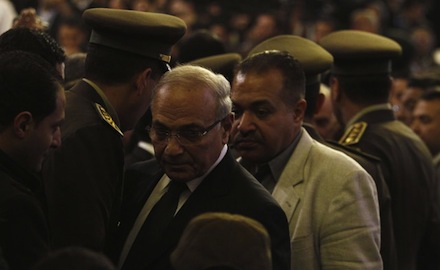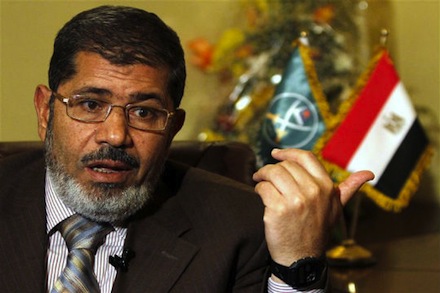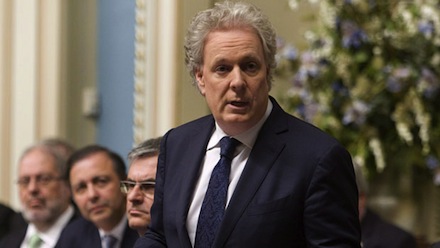UPDATE: 11:25 a.m. Cairo time. With nearly 20 million votes counted, it looks like Morsi is leading with 26.9% and Shafiq is second with 24.2%. Sabahi is in third place with 19.4%, Aboul Fatouh is close behind with 17.9%, and Moussa lags far in fifth place with 11.2%.
* * * * *
It’s still not official, Giza and Cairo returns are yet to be counted, and early returns are just that — early — but it’s looking increasingly like the Muslim Brotherhood’s candidate Mohammed Morsi has done fairly well, and that his opponent in the June runoff could well be Hosni Mubarak’s former prime minister and Air Force commander and civil aviation minister Ahmed Shafiq after a first round that could see any of five candidates emerge for the June 16-17 runoff.
The Muslim Brotherhood has been increasingly confident as the counting has gotten underway — even in a country like Egypt, which is undergoing its first free and fair presidential election in history, campaigns generally are not this cocky unless they are pretty certain of victory.
If indeed Shafiq is headed for a top-two finish, it would explain why former Arab League secretary-general and former Mubarak foreign minister Amr Moussa picked such an odd fight with Shafiq, calling for Shafiq to drop out of the race in the middle of the two-day voting window. In essence, Moussa may have been trying an 11th hour to paint Shafiq as the true ‘felool’ candidate of the race — the ‘remnants’ of the Mubarak era, attempting to undermine his voter base at the last minute.
As Ian Black wrote earlier for The Guardian, this is sort of a worst-case scenario for Egypt, a runoff between a ‘felool’ Mubarak deep-state retread versus the most conservative Islamist (and Muslim Brotherhood-approved) candidate in the race:
Mubarak’s last prime minister and former commander of the air force is described pejoratively by opponents as the “fuloul” – regime remnant – candidate. This run-off is the nightmare scenario because many people hate both men. A contest between them would be a highly polarised choice that would take Egyptians back to the bad old days before the revolution. The Brotherhood would mobilise massively behind Morsi, with the army and police supporting Shafiq. Violence would be highly likely to erupt. Abstention rates would soar.
A Morsi-Shafiq runoff would remind me of the Peruvian election in 2011, when leftist Ollanta Humala and Keiko Fujimori (daughter of the former Peruvian dictator) advanced to the second round runoff, while moderates Pedro Pablo Kuczynski, Alejandro Toledo and Luis Castañeda split the moderate vote. Mario Vargas Llosa, Peru’s Nobel laureate, likened it to a choice “between AIDS and cancer.”
If Egypt is indeed headed for a Morsi-Shafiq runoff, I think it indicates that we would have been otherwise seeing a runoff between two even more controversial candidates, had they not been disqualified in May: former Mubarak intelligence chief Omar Suleiman and Mubarak’s vice president in the final days of February 2011, and Salafist preacher Hazem Abu Ismail or perhaps even the Muslim Brotherhood’s first presidential candidate Khairat al-Shater. Suleiman would have appealed to the same “security first” voters that Shafiq has attracted. Abu Ismail was, as Morsi is now, the most conservative Islamist in the race — Abu Ismail was, in fact, much more conservative than al-Shater — in the same way, Morsi is a more conservative Islamist than his rival Islamist Abdel Moneim Aboul Fotouh, (forget for a moment that Aboul Fotouh, confusingly, has been endorsed by the more conservative Salafist Al-Nour Party and not by the relatively more moderate Muslim Brotherhood, of which he was a member until just last year).
In any event, a Morsi-Shafiq runoff would indicate that the May 15 disqualifications were the absolute pivotal turning point in the presidential race, for what it’s worth.
It would also indicate that, despite Egyptian frustration with the parliament’s dithering after January elections that saw the Brotherhood win nearly half of the parliament’s seats, the Brotherhood is clearly the most potent and organized political force in Egypt today. Morsi is neither the most charismatic nor the most accomplished candidate in the race — if he emerges not only in the runoff, but as the top choice in the first round, it will indicate that the Brotherhood has even more impressive organization and political muscle than we thought.








